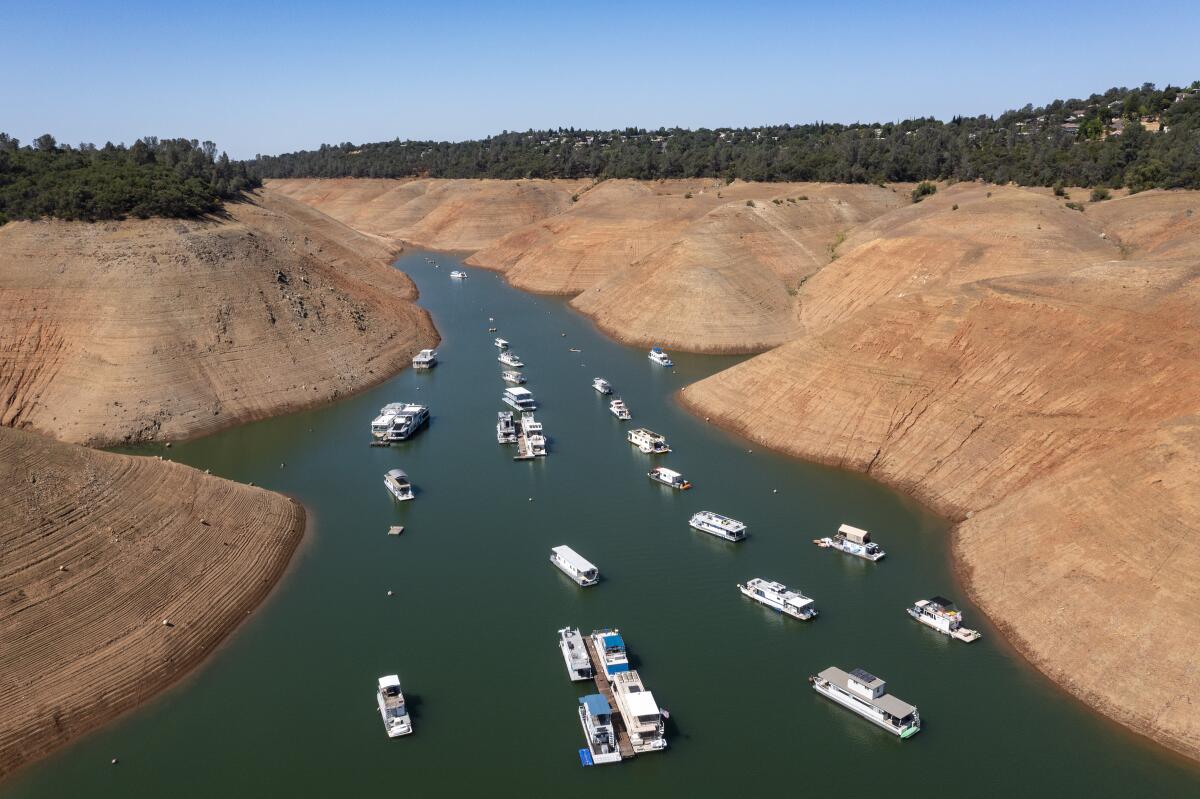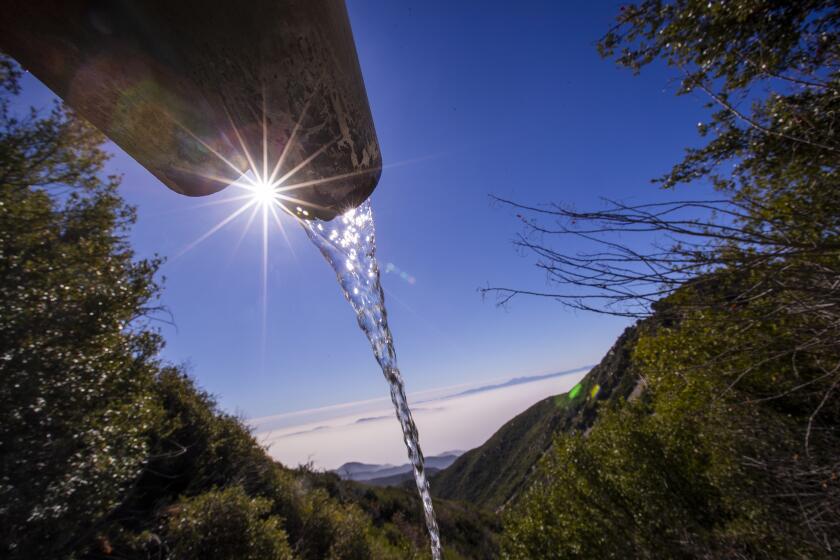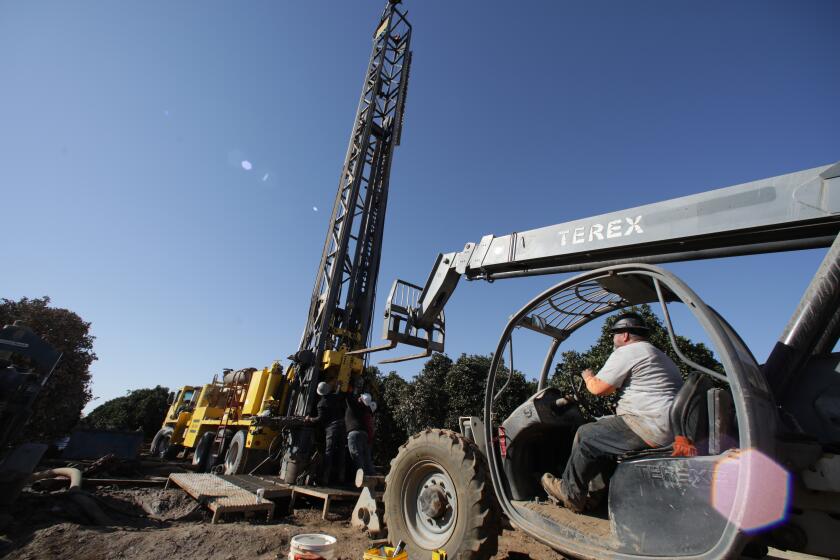Climate crisis and systemic inequities drive push to reform California water laws

- Share via
California’s mountain snowpack is shrinking, and climate change is intensifying the severe drought. Streams have dwindled and reservoirs have declined as vast quantities of water are diverted for farms and cities. Endangered fish are struggling to survive. And in farming areas in the Central Valley, hundreds of families are struggling with dry wells as groundwater levels continue to drop.
A group of prominent legal experts has presented a blueprint for updating California’s system of water laws to fix long-standing weaknesses and adapt to the worsening effects of climate change. They say their proposals, if adopted by the Legislature, would help the state better manage surface water and groundwater, protect vulnerable communities and ecosystems, and improve state oversight of the water rights system.
The group presented their 11 proposals this month, saying the reforms would represent a major revision of laws that govern diversions from streams and rivers, and would give state officials better tools to deal with mounting strains on the state water system.
“California’s water laws, they were adopted a long time ago ... in a California that was a very different place,” said Holly Doremus, a UC Berkeley law professor who was part of the group.
“It’s past time to take a broad look,” Doremus said. “Climate change makes the situation that much more acute.”
A company is siphoning water from a national forest to sell as bottled water. California water regulators want to limit the operation.
The group recommended changing state law so that decisions about water rights, including approvals of new diversions from streams and rivers, would require regulators to consider the effects of climate change. With the heating of the planet bringing more extreme droughts, the legal experts said there is an urgent need to change how California administers water rights, and to start monitoring in real time how much water is taken from rivers.
They called for measures to protect vulnerable Californians in low-income rural communities, who have unsafe contaminants in their tap water or wells that are at risk of running dry.
The group urged the Legislature to require completion of a long-delayed water-quality plan to protect threatened fish in the Sacramento-San Joaquin River Delta, the heart of the state’s water system. And they said the state needs to change the rules governing water releases from dams so that agencies must consider not only the flows that fish need but also the water temperatures — because warmer temperatures have taken a worsening toll on endangered salmon and other species.
“We are in a time of crisis. We have a climate crisis, we have wildfire crisis, and we have droughts intensifying over time,” said Jennifer Harder, a member of the group and a law professor at University of the Pacific’s McGeorge School of Law.
California passed its landmark groundwater law in 2014. The goals of sustainable management remain a long way off.
Harder and other lawyers in the group said they expect to face resistance but hope the unrelenting drought may help build support for changing California’s water laws. The group said in a 43-page report detailing their recommendations that they’re suggesting a “focused approach to updating existing laws, regulations, and funding.”
They recently presented their recommendations during a webinar organized by the Planning and Conservation League. The Sacramento organization convened the group more than a year ago to consider proposals for modernizing California water laws.
“This is not our report, but we do agree with its recommendations,” said Jonas Minton, senior water policy advisor for the Planning and Conservation League. He said there have been warnings for years that people will suffer from climate change in the future, but Californians are already seeing the water rights system “fail for disadvantaged communities, the environment, farms and our cities.”
Under the current system, the State Water Resources Control Board considers historical stream flow data in decisions about water rights permits, but that “is no longer defensible” as climate change leaves less flowing in watersheds, said Clifford Lee, a former state deputy attorney general who was one of the report’s authors.
“Climate change will result in less precipitation as snow; shift peak runoff from historical patterns to earlier portions of the year; shorten the precipitation season; and increase the intensity and frequency of drought,” Lee said. “There simply will be less water in the future.”
He said relying on historical water data to estimate future flows is the “Waiting for Godot fallacy.”
“As you all know, from the Samuel Beckett play, Godot never arrives,” Lee said. “And that is the problem with using historical data to determine future flow. The flow is not going to arrive.”
The last two years have been some of the driest on record in California, and extreme heat has compounded the problems by baking soils, increasing evaporation, and reducing flows in streams and rivers.
An unusually wet December blanketed the Sierra Nevada in heavy snow, but the snowpack shrank during an extremely dry January, and now stands at 79% of average for this time of year.
The water levels in California’s largest reservoirs remain far below average. And if March doesn’t bring wetter conditions, the state appears headed for another long summer of drought.
To better prepare for extremes, Lee said, climate effects must be incorporated into the water rights permitting process by requiring that any analysis of whether water is available be based on science that estimates likely future flows. The state should also adopt this approach, he said, in managing existing water rights.
Among its recommendations, the group said the state needs better water data. Lee said it’s astounding that California, the land of high technology and home of Silicon Valley, “lacks the ability on a real-time basis to determine who is diverting water from surface water sources, when such diversions are occurring, in what amounts.”
Under existing law, the state requires only that diverters report how much they used in the previous year.
“So basically, during the drought, the state is flying blind. We do not know who’s taking water,” Lee said. “It’s extremely important to get a handle on a real-time basis during drought.”
The lawyers recommended that California initially start real-time monitoring of diversions in at least two watersheds, then consider whether to expand tracking to other areas.
Another problem with the current system, they said, is that the state water board is unable to investigate the water rights of some of the state’s major water users — the most senior rights holders with pre-1914 claims — to determine whether they are valid, or whether some water users might be taking more than they should.
They recommended giving the state water board new authority to selectively investigate these water rights claims. Lee said this change would align California with other western states and make for a “more unified water rights system.”
Other members of the group included law professors from UC Davis and Stanford University, as well as former state water board member Tam Doduc.
The group proposed some changes aimed at addressing widespread problems of contaminated drinking water. Harder pointed out that an estimated 1 million Californians, including many in low-income communities of color, do not have access to safe drinking water. Many rely on household wells or small water systems where the water is contaminated with chemicals or naturally occurring pollutants such as arsenic.
“Many of these communities are historically underserved minority populations that have been subject to explicit and implicit racism in the delivery of services including water,” Harder said.
Harder said she and others in the group believe California water law should correct these systemic inequities and protect disadvantaged communities.
State legislators in 2012 passed a law recognizing access to clean water as a human right, and have since approved funding to pay for fixes in communities where the tap water isn’t safe to drink. The group recommended the state start requiring that at least one member of the state water board — and each regional water quality board — have experience working on environmental justice issues.
Other proposals focus on the continuing problem of wells going dry as heavy groundwater pumping in farming areas causes declines in aquifer levels. According to state data, more than 3,700 dry household wells have been reported since 2013, and the number of dry wells has risen dramatically over the last year. The state received reports of 975 household wells that ran dry in 2021, many in farming areas in the Central Valley.
The group called for measures to protect homeowners struggling with dry wells while the state gradually implements regulation under its 2014 groundwater law, the Sustainable Groundwater Management Act, which requires local agencies to develop plans to eliminate problems of chronic overpumping.
They suggested the state require local groundwater agencies to determine whether pumping will probably cause more wells to fail, and to ensure protections for people who depend on wells by deepening or repairing their wells if needed, or connecting their homes to new water pipes.
The state Department of Water Resources recently reviewed plans submitted by local groundwater agencies and told agencies in farming areas across the San Joaquin Valley that their plans are “incomplete” and will require changes to address widespread risks of more wells going dry, as well as other problems. The local agencies will have six months to revise their plans. If they fail to address the criticisms, state regulators could deem their plans “inadequate,” which would trigger intervention by the state water board.
Other proposals by the group focus on addressing threats to fish that are struggling to survive. The experts said the state water board should adopt long-delayed updates to the state’s Bay-Delta Water Quality Control Plan by the end of 2023.
They said the board also shouldn’t approve any new water rights permits or extensions in the watershed until the final plan is adopted.
“In light of the fish crisis in California and the state’s clear authority to address that crisis, the failure to get revised fishery flow objectives across the finish line, for whatever reasons, is an unacceptable public policy failure,” Harder said. “The group’s sense was that the fish don’t have time to wait longer for further delays.”
Harder noted that many of California’s surviving fish species are struggling, and some are at risk of extinction. Endangered winter-run Chinook in the Sacramento River, for example, have suffered major losses in drought years, in part because of warmer water temperatures.
The group said because cold water is vital for salmon, state law should be amended to require agencies that manage dams to ensure not only sufficient flows but also water temperatures cool enough to protect fish.
The report’s authors said they hope state legislators will take up their proposals and introduce bills.
The project followed a similar effort in 1977-78 by the Governor’s Commission to Review California Water Rights Law, created by then-Gov. Jerry Brown. Some of that commission’s recommendations were subsequently adopted, while others — such as managing groundwater — failed to gain traction for years.
If the Legislature were to adopt the full slate of proposals, the authors believe, the reforms would represent the most significant changes to California’s surface water laws since 1913.
Doremus said these proposals aren’t intended to be a complete list of needed upgrades, but rather a start to “move the system in the right direction” and make it work better for the 21st century.
More to Read
Sign up for Essential California
The most important California stories and recommendations in your inbox every morning.
You may occasionally receive promotional content from the Los Angeles Times.













